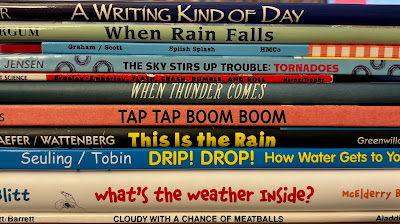This month the Poetry Sisters' challenge was to dream up an unanswerable question and answer it in a poem. For example, in the poem "How Many How Much," Shel Silverstein asked, "How many slams in an old screen door?"
On our Zoom call Sunday, we spent 5 minutes generating questions on our own, and then we shared them. It gave us a lot of ideas to work with! I tried writing to a couple of different prompts but found that every poem I started wound its way to an answer, which was not the point. Ultimately, I ended up with lots of questions and no answers.
Ode to Wonder
How many ticks in a grandfather clock?How many rings in a bell?
How many days in a rotating Earth?
How many pails from a well?
How many songs in 88 keys?
How many drops in the rain?
How many spins on a merry-go-round
How many thoughts in a brain?
Who made the stars?
What makes them shine?
Is there life beyond Earth in space?
Where are lost souls?
When are they found?
Why have they fallen from grace?
The why of the world
is a curious thing
with so many questions to ponder.
Sit down for a bit
and think big things
there's so much for us to wonder.
Poem ©Tricia Stohr-Hunt, 2024. All rights reserved.
You can find the poems shared by my Poetry Sisters at the links below.
Would you like to try the next challenge? In May we’re writing in the style of Lucille Clifton and are writing poem about body parts ala "Homage to My Hips." Are you in? Good! You have a month to craft your creation and share it on May 31st in a post and/or on social media with the tag #PoetryPals. We look forward to reading your poems!
In addition to this poem, I have been building a book spine poem each day to celebrate National Poetry Month. I hope you'll pop over to my April 26 post to check it out and explore some of the other poems I've written. If you've been following the Progressive Poem, you might like my April 25 poem, which was inspired by the unfolding plight of the poem's characters.
This week, Poetry Friday is hosted by Ruth at There is no such thing as a God-forsaken town. I hope you'll take some time to check out all the poetic things being shared today. Happy poetry Friday, friends!







